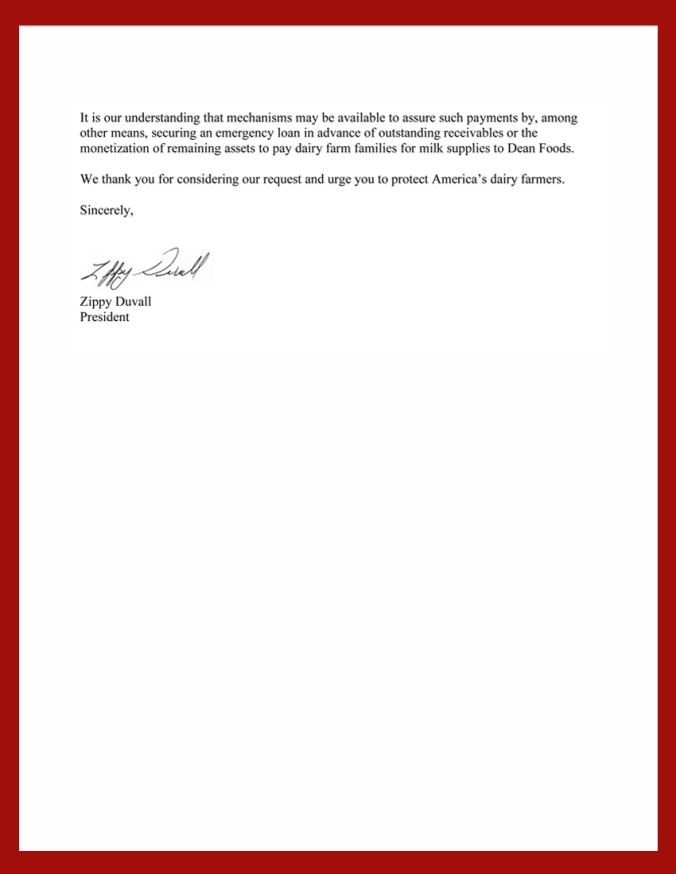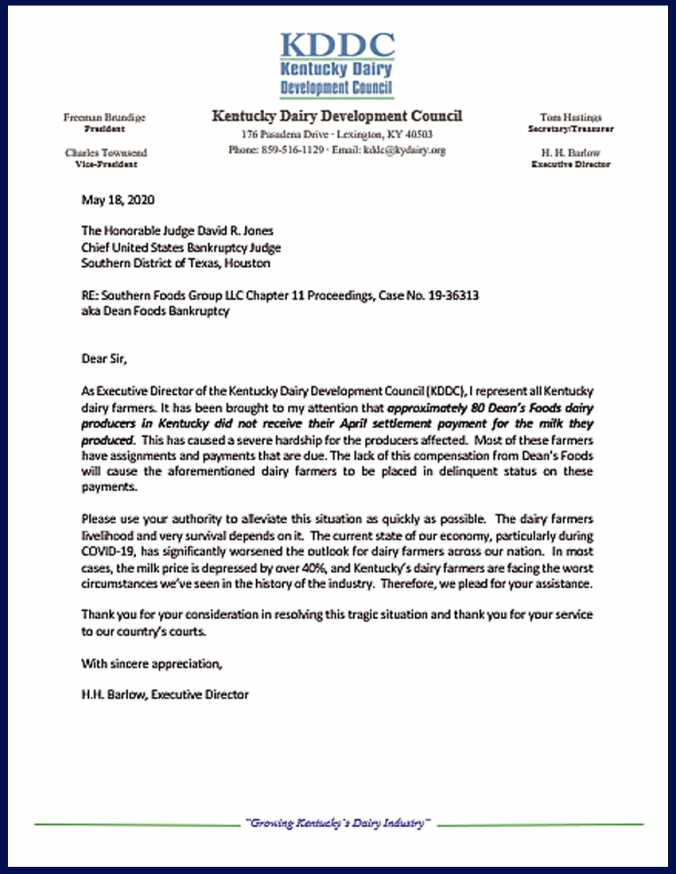
UPDATE – JUNE 9th, 2020: Southeast area farmers, previous Dean Independent producers, report that they have received funds for their April Settlement milk checks via electronic deposit into their bank accounts. This action follows several letters from producer organizations both to the Court and to the Committee for Unsecured Creditors.
Please scroll for letters from Zippy Duvall, President of the American Farm Bureau Federation, and H. Barlow, Executive Secretary of the Kentucky Dairy Development Council (KDDC), which were sent to the Court.
The Pennsylvania Milk Marketing Board was also active in the process to recover those payments to producers. Read more about their efforts here.
On behalf of the (former) Dean independent producers, we say “THANKS” to the Honorable Judge David Jones, the Court, Dean Foods estate officials, and to all who advocated on their behalf.
At this time, it is not known if dairy co-ops or the FMMO Producer Settlement Funds have received the balance of the funds owed to them by the Dean Foods Estate.
Letter from Zippy Duvall, President, American Farm Bureau, to the Court and Dean Foods (Estate) Officials


Letter from H. Barlow, Executive Secretary, KDDC, to the Court:

The story as first reported:
Payments to Farmers Late at Best, in Question for the Future
A May 13, 2020 memorandum from USDA-Agricultural Marketing Service, Appalachian Order, reads as follows:
TO: Regulated Handlers
FROM: Harold H. Friedly, Jr., Market Administrator, F.O. 5
SUBJECT: Producer Settlement Fund Non Payment
On May 12, 2020, Dean Foods, DIP (debtor-in-possession), a regulated handler on the Appalachian Order, did not pay its obligation to the Producer Settlement Fund (PSF) as required by Federal Milk Marketing Order regulations. USDA recognizes the significance of this non-payment and is continuing to work with the Department of Justice to attempt to recover these monies as part of the Dean Foods, DIP, estate.
When payment is not made to the PSF, Federal Milk Marketing Order regulations prescribe procedure for how the remaining marketwide pool monies should be distributed to handlers (1005.72). When PSF monies are not sufficient to make full payments to handlers, the Market Administrator shall reduce uniformly such payments to handlers due a payment from the PSF.
Accordingly, for milk pooled on Order 5 during April 2020, payments to handlers from the PSF have been reduced pro rata. Should the PSF payments be recovered from Dean Foods, DIP, Estate at a later time, full payments will be distributed. In the meantime, Federal Milk Marketing Order regulations provide for reduced payments to producers from regulated handlers who did not receive full payment from the PSF (1005.73(c)). Consequently, the enforced minimum payments to producers will be at the pro rata amount.
USDA will continue to monitor the situation and work to assist the dairy industry. Additional information will be provided as it becomes available to all market participants. Please feel free to contact Jason Nierman, via nierman@malouisville.com, or (502) 499-0040, ext. 222, if you have any questions.
The memorandum also had this addendum included:

This schematic explains workings of a Producer Settlement Fund:

News could not have come at a worse time:
From an industry viewpoint, this non-payment could not come at a worse time for the farmers themselves.
When monies are received by the Producer Settlement Fund, they in turn are paid back out to handlers (co-ops or agents), who then distribute the money to farmers, paying them for milk sold (see the diagram above). This process is highly regulated by FMMO rules, and has proven to be predictable, and reliable for decades.
Farmers then use their money to pay bills to any number of agribusiness and service firms with whom they do business. Since this process has been so reliable, most farmers have set-up automatic withdrawals to pay supply companies. Farmers will now be dealing with any issues related to those automatic withdrawals and any repercussions due to lack of funds. Agribusinesses will lose money as well, and incur any number of extra costs.
Ravaged by a myriad of challenges due to Covid-19, farmers are facing financial stress of an untold magnitude, and many multi-generational farms with long histories of serving consumers are at risk of being lost. The mental health and fortitude of those farmers is a prime concern across the country, due to the stresses which were already in place. Many fear that this news could catalyze additional health issues in farm communities.
An industry insider, who asked not to be identified, said this Dean Foods payment to the PSF could normally be in a range from $160-$250 million, affecting dairy co-ops, individual farms and the communities they serve in many states. (Note – this figure will be verified and updated if needed – Covid 19 has changed almost everything.)
PERPLEXING: WHY did this happen given Chapter 11 processes?
This payment, which is a regular course of business in both a predictable amount and timing in getting farms and co-ops paid for milk, had regularly been made by Dean Foods during the course of the Chapter 11 proceedings.
Therefore, it stands to reason that attorneys, accountants, and consultants representing Dean Foods should have budgeted and accounted for these payments as Dean Foods books were closed out over the course of the next few months. In the last months of the process, fluid milk sales were up substantially according to many sources, which should also have added to Dean Foods income. (An email inquiry to an attorney representing Dean Foods in the proceedings has not received a response as of this posting.)
This gets even more perplexing since farmers were named as critical vendors in the early days of the Chapter 11 process. Dean Foods officials filed motions, which were granted by the Court, to ensure that those payments were indeed accomplished. It was believed those financial obligations to farmers for products delivered would have been honored until the last payment was due.
Impact on an individual farm: During this payment cycle, any single farm would be due payments from thousands of dollars to even hundreds of thousands of dollars, depending on the size of the herd.
POSSIBLE SOLUTIONS OR HOPE AHEAD?
At this time, this is a profound question with unknown answers. Some of those answers might be:
- Payment to Settlement Funds in all FMM Orders might come at one of the later dates in this payment cycle, being only a few days late
- Payment to the Producer Settlement Fund might come later, as accounts receivable from product and property sales come into the Dean Estate
- Payment to farmers might not come at all, which is a bitter pill to swallow at this juncture in history.
Whatever the answer is, farmer co-ops and individual farmers deserve that answer, and deserve it quickly. Perhaps a projected payment schedule could be stated by the Dean Foods Estate officials. Even if it’s a worst case answer, to know what that answer is will honor the dignity of earnest farmers who deserve an answer so they can make some possibly excruciating decisions, instead of ‘the system’ tap dancing around farm families like performers on a Broadway stage.
According to the Dean Foods / Southern Foods Group, LLC Chapter 11 website, two additional Omnibus Hearings are scheduled for May 20 and June 24.
One dairyman has often said “The dairy industry at the grass roots level is a dairy community full of really good, decent people who want to earn an honest living and contribute to their communities. However, those good people often have to endure some very wicked events.”
Dean Foods has historically paid its ‘independent producers’ well, which is much appreciated. It is sincerely hoped that Dean Foods closes its chapter on a better note than this non-payment, and quickly rectifies this payment shortfall to farmers. For the sake of the mental and physical health of many farmers and their families, lets hope they do just that.









